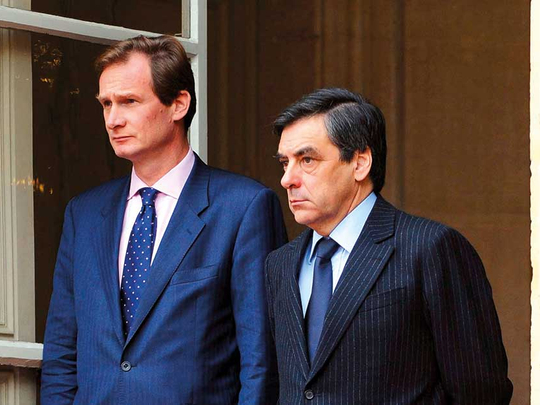
Brussels: Discreet, unflappable and unknown outside the corridors of European diplomacy: Nicolas de la Grandville runs the logistics of Brexit talks.
He is the man at the back of the room in the official photo, but he never stays for the talks. Instead, he is usually the last person to close the doors, ushering out photographers and hangers on.
When tensions run high on the billion-euro issues at stake, this veteran French diplomat has to ensure everything else ticks along. Will interpreters be needed? Does the Brexit secretary get a working or a social lunch? Will the principals stop for a handshake and a grin for the cameras, or get straight to business?
As the European commission’s head of protocol, De la Grandville orchestrates the diplomatic niceties and logistics for around 500 meetings a year taking place inside the Berlaymont headquarters. On one day in May, Donald Trump, Emmanuel Macron and Recep Tayyip Erdogan trooped through EU buildings for separate meetings (although only the French president went to the commission HQ). And for anyone who thinks protocol is the diplomatic equivalent of knowing which forks to put out, he will set you straight.
‘Treat everyone as equals’
“Protocol is the common grammar of international relations,” De la Grandville said in an interview. “This is simple hospitality, being open, kind, confident to other people.” Everyone is treated equally — no soggy sandwiches or chilly welcome for Davis, the UK’s Brexit secretary. Brexit is “a very specific negotiation” for both sides and he says “protocol is there to treat people in the best way possible”.
It is a demanding job that does not take no for an answer. In October 2015 at the height of Europe’s migration crisis, the commission president Jean-Claude Juncker summoned De la Grandville. “The president said ‘I am afraid I am going to spoil your weekend, we are having a leaders’ meeting on Sunday afternoon on migration’. So we said OK.”
At the drop of a hat, De la Grandville and his team set to work organising the logistics and security for an emergency summit involving EU and Balkan leaders, working with nearly a dozen national entourages and security services — complicated by a last-minute invitation to Albania.
Being in charge of protocol means being “yes minister people” for the sake of ensuring the EU’s work runs smoothly, he says. You cannot say “it is not possible, for technical reasons, for security reasons, we don’t have enough chairs. No! You go and do it”.
More recently, he was involved in organising the first-ever EU ‘state funeral’ for the former German chancellor Helmut Kohl. As the leader who presided over German reunification and drove EU expansion and integration, Kohl was granted an unprecedented European ‘ceremony of honour’. His coffin, draped with the EU flag, lay in state at the European parliament in Strasbourg at a ceremony, attended by dozens of past and present world leaders. The whole event was organised in less than two weeks: a logistical and diplomatic high-wire act, requiring talks with Kohl’s divided family, EU institutions, German government and German police, as well as alteration to the Strasbourg chamber. Time was short: “You can’t sit down and say we are going to open a reflection group.”
Adviser to first wives
De la Grandville studied his craft in institutions feted as the ultimate schools of diplomacy: the French foreign ministry and the Elysee Palace. He was diplomatic adviser to Cecilia Sarkozy, when her marriage to the then French president broke apart. Unsurprisingly, he is too tactful to comment on his walk-on role in the soap opera of the Sarkozy marriage. But he reflects: “You cannot make as if the family did not exist, they are there and it is difficult.”
He carries the same level of discretion into his current role. “I am very bad at remembering and telling anecdotes,” he says. But things can go wrong: a late flight, a motorcade separated at traffic lights, a leader who turns up with an unexpectedly large entourage, triggering awkward conversations to keep an underling outside the room. “You have to take care that it is always a peer-to-peer discussion,” he explains. “And this is not always understood.”
Other EU protocol chiefs had to grapple with public gaffes and mishaps. In 2006 Jacques Chirac walked out of an EU summit when a fellow Frenchman committed the unforgivable sin of speaking English. A few years later Greenpeace activists pulled off a colossal breach of security when a car was driven into the secure zone of an EU summit to relay a message on global warming at the leaders’ VIP corner.
Gaddafi’s pose
And during a period of rapprochement with the west in 2004, Libyan dictator Muammar Gaddafi made a controversial visit to commission headquarters, accompanied by his all-female troop of bodyguards, who posed for the cameras.
And when it is time for the Brexit secretary, or a prime minister or president to go home, De la Grandville will look for a signal. “I open the door and catch the eye so they see me,” he says. “Either they say yes or they say leave us in peace and they take again the initiative [to continue]. If they have something to discuss that is fine, I am not going to say ‘please kids go to bed’. That is not the way to do it.”
—Guardian News & Media Ltd












